To say that healthcare is changing would be an understatement. Technology is transforming it, and some healthcare jobs may cease to exist in future. It is exciting to see what kind of new jobs will come about and what type of training will be required for the next-generation workforce.
Without a doubt, the jobs will be novel, without precedent, and need extensive training. Being aware of this will be important not just to prepare the workforce but also to prevent some of these roles from becoming a reality.
Below is Frost & Sullivan’s take on 10 jobs that are likely to come about in the near future:
Reconstructive Surgery 3D Printing Specialists
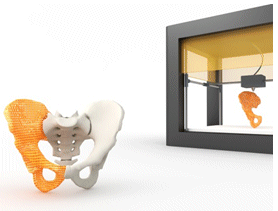 3D printing applications for healthcare have come a long way – from custom orthopedic implants to ‘organoids’ made from living cells for drug testing, and now using live cells for ‘living tattoos’ that detect specific biomarkers in sweat. In future, burn/accident victims will be given new skin (and probably more) that was grown using their cells and 3D printed for use in reconstructive surgery. A new breed of 3D printing technicians who specialize in tissue generation will be required.
3D printing applications for healthcare have come a long way – from custom orthopedic implants to ‘organoids’ made from living cells for drug testing, and now using live cells for ‘living tattoos’ that detect specific biomarkers in sweat. In future, burn/accident victims will be given new skin (and probably more) that was grown using their cells and 3D printed for use in reconstructive surgery. A new breed of 3D printing technicians who specialize in tissue generation will be required.
Voice Assistant Healthcare Content Specialists
Healthcare stakeholders have realized the power of using voice-based virtual assistants like Amazon’s Alexa to support the home care needs of seniors for aging in place or medication adherence for chronic disease management. While these applications are still evolving and additional applications for healthcare are likely to be introduced, virtual assistants are still naïve and are not necessarily equipped to handle queries posed by users. For example, will telling a virtual assistant that you are depressed trigger additional checks to gauge intensity for suicide risk? At present, the people behind the content are developers and not healthcare specialists; however, in future, as voice assistants evolve to serve additional healthcare areas, domain specialists who can build content will become a necessity to provide accurate and relevant content.
Robotic Clinical Documentation Scribes
Clinical documentation is a painstaking process; doctors probably spend hours on this, instead of focusing on patients. While a combination of voice recognition, natural language processing, and artificial intelligence will automate this task in future, a human supervisor will still be needed to proofread and ensure that the documentation is accurate, as any mistakes in this crucial process could be detrimental to patient outcomes.
Virtual Hospital Managers
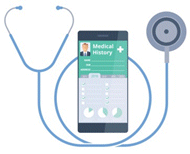 Virtual hospitals are a rising trend; Mercy Virtual in the United States calls itself “a hospital with no beds.” The entire 125,000-square-foot facility has 330 staff members, but patients are managed virtually through telehealth-based approaches. Soon, such facilities will need dedicated managers who are well versed in webside manners, ethics, and other aspects associated with delivering care virtually.
Virtual hospitals are a rising trend; Mercy Virtual in the United States calls itself “a hospital with no beds.” The entire 125,000-square-foot facility has 330 staff members, but patients are managed virtually through telehealth-based approaches. Soon, such facilities will need dedicated managers who are well versed in webside manners, ethics, and other aspects associated with delivering care virtually.
Precision Medicine Compounding Pharmacists
Future patients will be treated with precision medicine as a norm, making bulk pharmaceutical drugs obsolete, at least for this purpose. Compounding pharmacists will oversee robots that take care of the process and feed them with the right information about the patients based on their genetics and individual characteristics, as defined by medical imaging and analytics.
Epigenetic Counselors
 The role of a genetic counselor may evolve, or scientific advancements may give rise to a completely new breed of counselors who not only deal with DNA sequences but with the involved epigenetics as well. As research leads to new discoveries, varying levels of evidence indicate that several diseases and illnesses are associated with (but not necessarily caused by) epigenetic changes. As our understanding of this linkage improves, epigenetic counselors will educate adults and the younger generation to make the right choices to ensure healthier lives.
The role of a genetic counselor may evolve, or scientific advancements may give rise to a completely new breed of counselors who not only deal with DNA sequences but with the involved epigenetics as well. As research leads to new discoveries, varying levels of evidence indicate that several diseases and illnesses are associated with (but not necessarily caused by) epigenetic changes. As our understanding of this linkage improves, epigenetic counselors will educate adults and the younger generation to make the right choices to ensure healthier lives.
Health Finances Planners
Evolving technologies are always expensive until they become mainstream. With the rapid pace of new technology development for healthcare, advanced, quality healthcare might just be too expensive. Reimbursement by health insurance may not always be available, and this trend will give rise to a new role for financial experts—health finances planners. Much like assisting with income tax filings, these planners will help people choose the right health insurance coverage for their needs and plan for health events (anticipated, such as cancer, based on predetermined genetic risk, and unanticipated) by investing early on in the right options to generate sufficient funds.
Brain Neurostimulation Specialists
Similar to hackers, this role can be ethical and medically approved in the healthcare context, or even illegal, like drug dealers. Determining the appropriate level of stimulation to manage pain (in the current context), or even enhancing abilities, such as improving concentration and focus through nerve stimulation (at a basic level – without the ingestion of drugs or the use of implants), could be medically approved tasks for this role. On the illegal (in future, this could become legal) side, this could include the creation of the hallucinating effects of drugs without the potential side effects. This is a fascinating role, but it will involve significant risks as the brain’s functioning will be interfered with, without the knowledge of long-term effects.
Health Data Hackers
 Another dark role of the future involves health data-focused hackers who will have ample targets to choose from—the smart home, one of several connected devices around individuals, and even smart hospitals and clinics. Currently, medical records are far more valuable on the black market than just credit card information or Social Security numbers. In future, health data could be valuable for a variety of reasons, not just for identity theft, but also to make it available for targeted advertising campaigns, to permit illegal medical practices (for example, connecting black market organ transplant entities with potential customers), or worse, to enable assassination attempts to look like natural deaths.
Another dark role of the future involves health data-focused hackers who will have ample targets to choose from—the smart home, one of several connected devices around individuals, and even smart hospitals and clinics. Currently, medical records are far more valuable on the black market than just credit card information or Social Security numbers. In future, health data could be valuable for a variety of reasons, not just for identity theft, but also to make it available for targeted advertising campaigns, to permit illegal medical practices (for example, connecting black market organ transplant entities with potential customers), or worse, to enable assassination attempts to look like natural deaths.
Biological Terrorists
The darkest possible role is that of the terrorist. The last decade has seen the most activity in terrorism, and as with nuclear power, every rogue entity wants to lay its hands on the latest advances for mass casualty or maximum damage. Biological terrorism, which looked like a distant possibility in the past, will become a reality in future due to advancements that allow the development of intimidating weapons. With advances like CRISPR, it may be possible to engineer a stronger, multi-drug resistant variety of bacteria that can cause fatal infections and may be difficult to treat with the available antibiotics—and this is just one possibility.
A list of future healthcare jobs compiled using input from Frost & Sullivan as well as other futurists in the field is presented below.
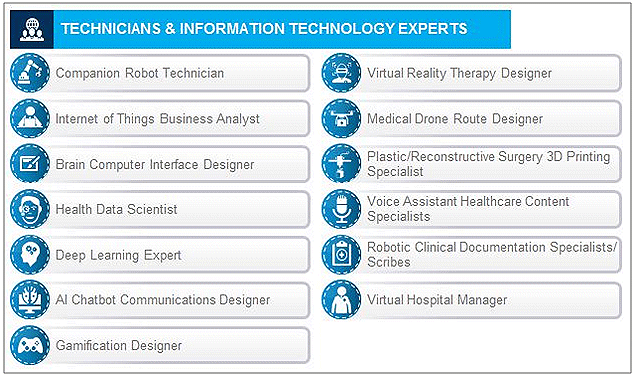
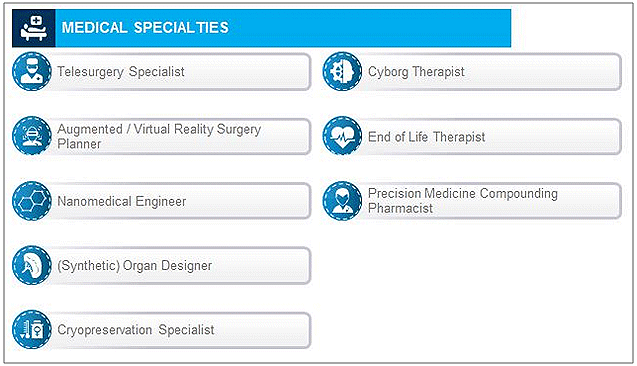
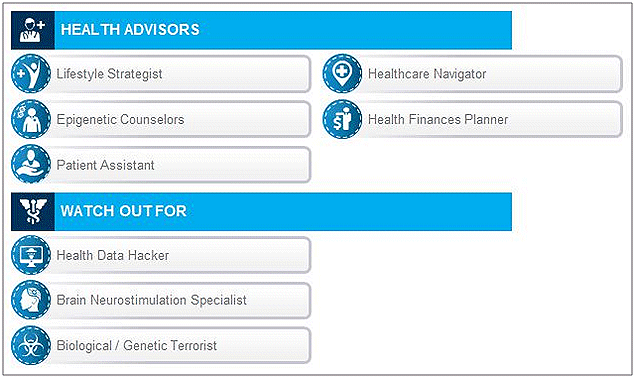
With advancements in medical technology, many of the positions in these lists will be the fastest-growing healthcare jobs this decade. Let us know what you think in the comments below.
This article was published in Forbes – http://bit.ly/2CDfZQX.



